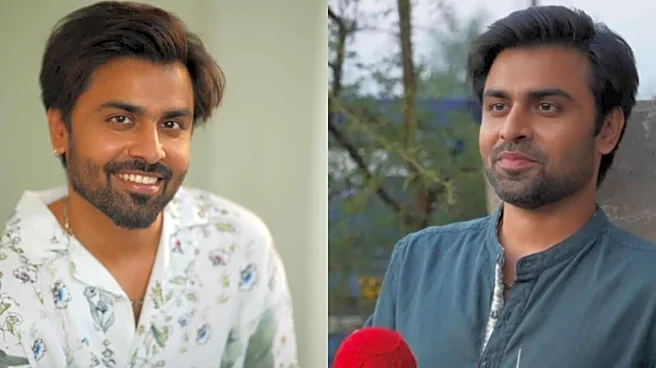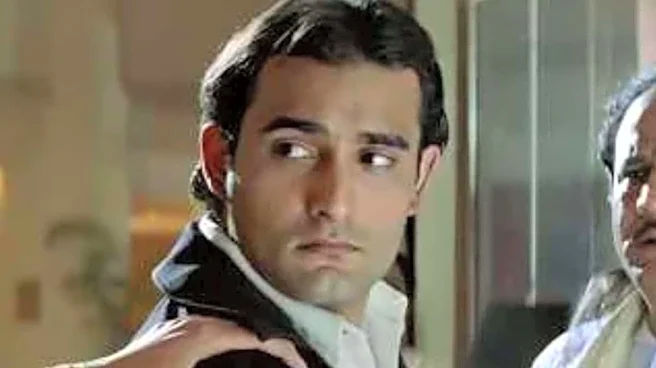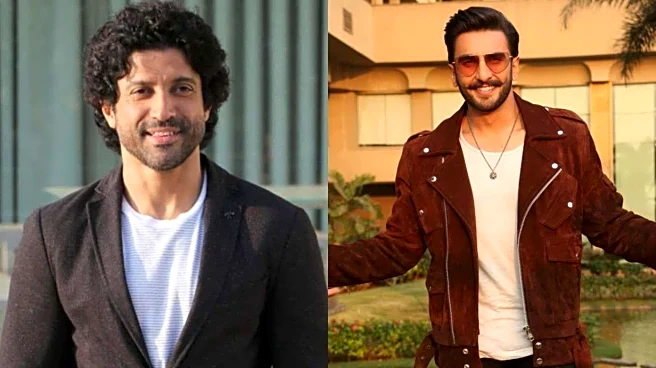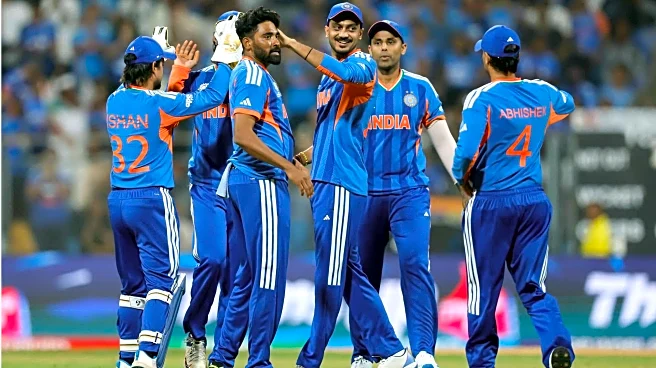For most audiences, Jitendra Kumar is the man who made vulnerability cool — the quiet teacher, the awkward lover, the man next door who somehow carries the entire emotional weight of a scene without raising his voice. But in Bhagwat Chapter One, he becomes something else entirely. The warmth is gone. The humour is gone. What remains is stillness, the kind that unsettles you.
This is not the Jitendra Kumar we know from Panchayat or Kota Factory. This is Rajkumar — a man who doesn’t kill out of rage or revenge, but out of belief. A manipulator who wears normalcy like a mask. He doesn’t stalk his victims in alleys or shadows; he disarms them with empathy. It’s the ordinariness that makes him terrifying.
“I was told not to study real-life killers,”
Jitendra recalls with a calm smile. “The team said, ‘We’ve written him differently. Don’t over-research. Just follow our vision.’” The result is a character who hides his darkness beneath decency, whose menace lies in restraint rather than theatrics. “He’s not the guy twirling a moustache,” he says. “He believes he’s doing the right thing.”
That belief — the conviction that drives every monster to justify his acts — is what fascinated Jitendra most. For an actor known for emotional transparency, this role demanded opacity. “The brief was clear,” he says. “He should look as normal as possible. The audience should never see it coming.”
What unfolds in Bhagwat Chapter One is not just a crime drama inspired by figures like Cyanide Mohan. It’s a study of the thin line between morality and madness, between conviction and corruption. “Sometimes we think we’re doing the right thing,” Jitendra says softly, “but that belief itself can destroy us.”
The transformation didn’t come easy. After years of playing characters who were loved for their honesty and innocence, stepping into the skin of a man who manipulates emotion for control required quiet recalibration. “I didn’t want to play him like a villain,” he explains. “He’s not performing evil; he’s living it.”
And yet, despite the darkness, Jitendra never lost his center. “Once the director says ‘cut,’ I switch off,” he says. “I don’t replay scenes in my mind. I go home, meet friends, watch something light. That’s my detox.”
The actor’s calm realism extends beyond his roles. Whether it’s his easy camaraderie with Arshad Warsi on set or his ability to find humanity in every story — even one about a serial killer — Jitendra approaches acting like quiet observation. “Every role has its challenges,” he says. “Even a simple one like in Panchayat. You just have to find what’s human in it.”
Now, as rumours swirl about his next chapter — from viral behind-the-scenes clips with Ali Fazal to whispers of Mirzapur: The Film and the possible return of Kota Factory — Jitendra Kumar seems completely unbothered. “I love the speculation,” he laughs. “Let people guess. It creates excitement. That’s part of the fun.”
In this News18 Showsha exclusive, the actor opens up about the darkness of Bhagwat Chapter One, the conviction that shapes monsters, and why even at his most unrecognizable, he still believes the most dangerous thing about evil is how ordinary it looks.
Here are the excerpts:
Your character in the film isn’t a stereotypical serial killer, but rather someone who manipulates and adapts identities to lure victims. How did you mentally prepare to inhabit such a disturbing persona?
Most of the preparation came from discussions with the writer and director about how they wanted me to perform and what emotions and layers they wanted to see. Initially, I thought I would have to research real-life serial killers and read about them, but the team told me not to. They said, “We’ve designed this character differently in the script, so don’t go too deep into research. Just follow our vision.”
That’s how it began. Rajkumar is more of a manipulator — someone who plays mind games. The brief was clear: make him look as normal and regular as possible. He shouldn’t appear like a villain or have an evil face. That’s what made it so interesting. We wanted the audience to see a human side — the fragility and ordinariness that make such people dangerous.
So the main challenge was balance — hiding the darkness without overexpressing it. If he looked overtly villainous, the manipulation wouldn’t work. We had to constantly tone it down. In the first few days of shooting, it took time to find that right note, but by the seventh or eighth day, it started to flow naturally.
Most of your past roles have had warmth or humor, but here you had to embody absolute darkness. What was the most difficult part — entering that space, or stepping out of it?
Honestly, all my characters — no matter how different — act out of conviction. Even in Bhagwat, Rajkumar doesn’t believe he’s doing anything wrong. That was the key. He’s fully convinced that what he’s doing is justified in his own world.
Every scene had to come from that place of conviction. He’s not twirling a moustache or thinking, “I’m evil.” He’s justifying his actions logically, like anyone would justify their own choices. That’s what made it disturbing — his normalcy.
A character like this must take a mental toll. How did you detox or step out of that headspace after shooting such intense scenes?
It wasn’t too difficult, honestly. We were working with Arshad Warsi sir, and the atmosphere on set was positive. After pack-up, the team would often organize small get-togethers or parties. That really helped in disconnecting.
Personally, once shooting ends, I make it a point not to think about my characters too much. When the workday is over, I try to switch off — maybe watch a comedy film, meet friends, or do something light. It’s important not to overthink what you’ve performed or replay scenes in your mind. That’s how I avoid stress and maintain balance.
Once the director says, “Cut, perfect,” I move on. I don’t dwell on it. That’s the only way to stay sane when you’re doing such intense roles.
Your film Bhagwat Chapter One is reportedly inspired by real-life figures like Cyanide Mohan and others. What do you think the film is really saying about the society that produces such men?
At its core, I think Bhagwat Chapter One leaves behind a deep emotional impact. When audiences watch it, they will definitely feel something intense and unsettling. Aisha’s character, for instance, is very Indian and quite inspiring — she represents resilience and morality.
The film really makes you reflect on the thin line between good conviction and bad conviction. Sometimes, we genuinely believe we are doing the right thing, but that belief itself can be flawed. My character, inspired by someone like Mohan (the so-called “Cyanide killer”), also believed that what he was doing was justified. He thought he was right.
The film tries to show how someone like that rationalizes his actions — and how that mindset becomes terrifying and harmful for society. The story explores that moral blur — how easily conviction can turn into destruction. It will make audiences walk away questioning themselves, wondering if they’ve ever mistaken “belief” for “truth.”
You share a very layered psychological dynamic with Arshad Warsi on screen. How was your experience developing that chemistry with him?
Honestly, it was very easy working with him. We didn’t need to consciously build that chemistry beforehand. We didn’t even do a formal reading together because both of us were busy shooting other projects. But the moment we met on the first day of shoot, the connection happened naturally.
Arshad Sir is an incredible actor — he responds instinctively and gives you so much to react to. So the chemistry just flowed. It wasn’t something we had to construct; it emerged on its own as the scenes unfolded. That made the entire experience a lot of fun and very organic.
You’ve now explored both light and dark sides of human emotion on screen. What kind of stories attract you now — ones that comfort you, or the ones that challenge you?
Honestly, I don’t think comfort really exists for an actor. Every character comes with its own set of challenges. Even something simple — like my role in Panchayat — seems easy from the outside, but it’s not. That character doesn’t have big dialogues or dramatic moments. He just reacts to situations around him — and translating that subtlety onto the screen was a huge challenge.
Every role demands something different. Whether it’s a dark manipulator in Bhagwat or a soft-spoken government officer in Panchayat, each comes with unique risks. As an actor, your job is to keep the mystery alive — not to make it so obvious that the audience stops thinking.
I’m most attracted to human stories — characters that behave like real people, that feel possible. When I read something and feel, “Yes, this could happen. These people could exist,” I get excited to play it.
Of course, sometimes you get imaginative roles too — ones that don’t exist in real life, like magicians or even supernatural beings. Those are fun because you don’t have references; you create them entirely through imagination. But personally, I find the most joy in stories rooted in reality, in emotions that feel human and true.
A behind-the-scenes clip featuring you and Ali Fazal recently went viral and sent the internet into a frenzy. There’s a lot of speculation that you might be replacing Vikrant Massey in Mirzapur The Film. What’s the truth behind these rumours?
(Laughs) I’m really enjoying these speculations! Honestly, I love how people start guessing and creating their own excitement — it adds fun for both sides. The audience is curious, and that curiosity fuels our energy too. Whatever we’re working on, it should always create that kind of buzz. So yes, I’m loving the excitement and the theories, even though I can’t confirm anything right now!
Fans are also wondering if you’ll be a part of Kota Factory Season 4. Can we expect Jeetu Bhaiya to return?
As of now, there hasn’t been any official discussion about Season 4. My character, Jeetu Bhaiya, left Kota at the end of the previous season, so where the story goes next — and how the makers plan to write it — is still undecided. We haven’t started conversations about what direction the next season will take or how the episodes will unfold. So, at this point, there’s no clarity, but let’s see how things shape up.
Finally, what’s next for you? What kinds of stories or characters are you drawn to these days?
There are many exciting stories and projects in the pipeline — both films and series — and I’m genuinely thrilled about them. Personally, I enjoy every genre that has a real human story at its core. Whether it’s drama, comedy, or something darker, if it’s rooted in human emotion and truth, I find it compelling.
There’s a lot coming up soon, and I can’t wait for the audience to experience these new worlds and characters.





/images/ppid_a911dc6a-image-177107062796921011.webp)




/images/ppid_a911dc6a-image-17710700586131340.webp)
/images/ppid_a911dc6a-image-177107002875928030.webp)
/images/ppid_a911dc6a-image-177107008754197673.webp)

